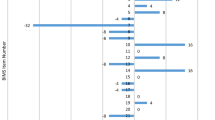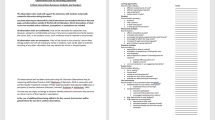Abstract
The present follow-up study examines the effect of university teachers’ pedagogical training on approaches to teaching and self-efficacy beliefs measured by Approaches to Teaching Inventory and an additional part measuring motivational strategies. The effect of pedagogical training on teaching is analysed among 35 teachers who had not participated in pedagogical courses after the first measurement in 2004 as well as among 45 teachers who had acquired more pedagogical training after the first measurement. The results showed that there were more positive changes in the measured scales among teachers who had acquired more credits of pedagogical courses since the year 2004 than among teachers who had not acquired more credits. The results of the first and second measurements are compared.




Similar content being viewed by others
References
Åkerlind, G. S. (2003). Growing and developing as a university teacher – Variation in meaning. Studies in Higher Education, 28, 375–390.
Bailey, J. G. (1999). Academics’ motivation and self-efficacy for teaching and research. Higher Education Research & Development, 18, 343–359.
Bandura, A. (2000). Self-efficacy. The exercise of control. New York: W. H. Freeman and Company.
Becher, T. (1989). Academic tribes and territories: Intellectual enquiry and the cultures of disciplines. Buckinghamshire: Society for Research into Higher Education and the Open University Press.
Biggs, J. (1999). Teaching for quality learning at University. Buckingham: Open University Press.
Biglan, A. (1973). Relationships between subject matter characteristics and the structure and output of university departments. Journal of Applied Psychology, 57, 204–213.
Boshuizen, H. P. A. (2004). Does practice make perfect? A slow and discontinuous process. In H. P. A. Boshuizen, R. Bromme, & H. Gruber (Eds.), Professional learning: Gaps and transitions on the way from novice to expert (pp. 73–95). Netherlands: Kluwer Academic Publishers.
Coffey, M., & Gibbs, G. (2000). Can academics benefit from training? Some preliminary evidence. Teaching in HigherEducation, 5, 385–389.
Eley, M. E. (2006). Teachers’ conceptions of teaching, and the making of specific decisions in planning to teach. Higher Education, 51, 191–214.
Gibbs, G., & Coffey, M. (2004). The impact of training of university teachers on their teaching skills, their approach to teaching and the approach to learning of their students. Active Learning in Higher Education, 5, 87–100.
Gordon, C., & Debus, R. (2002). Developing deep learning approaches and personal teaching efficacy within a preservice teacher education context. British Journal of Higher Education , 72, 483–511.
Guskey, T. R. (2000). Evaluating professional development. Thousand Oaks: Corwin Press.
Ho, A., Watkins, D., & Kelly, M. (2001). The conceptual change approach to improving teaching and learning: An evaluation of a Hong Kong staff development programme. Higher Education, 42, 143–169.
Kember, D. (1997). A reconceptualisation of the research into university academics’ conceptions of teaching. Learning and Instruction, 7, 255–275.
Kember, D., & Kwan, K. (2000). Lecturers’ approaches to teaching and their relationship to conceptions of good teaching. Instructional Science, 28, 469–490.
Lindblom-Ylänne, S., & Hämäläinen, K. (2004). The Bologna declaration as a tool to enhance learning and instruction at the University of Helsinki. International Journal for Academic Development, 9, 153–165.
Lindblom-Ylänne, S. & Nevgi, A. (2003, August). The effect of pedagogical training and teaching experience on approach to teaching. (Paper presented at the 11th EARLI conference, Padua).
Lindblom-Ylänne, S., Trigwell, K., Nevgi, A., & Ashwin, P. (2006). How approaches to teaching are affected by discipline and teaching context. Studies in Higher Education, 31, 285–298.
Lueddeke, G. R. (2003). Professionalising teaching practice in higher education: A study of disciplinary variation and ‘teaching-scholarship’. Studies in Higher Education, 28, 213–228.
Martin, E., & Lueckenhausen, G. (2005). How university teaching changes teachers: Affective as well as cognitive challenges. Higher Education, 49, 389–412.
McAlpine, L., & Weston, C. (2000). Reflection: Issues related to improving professors’ teaching and students’ learning. Instructional Science, 28, 363–385.
Norton, L., Richardson, J. T. E., Hartley, J., Newstead, S., & Mayes, J. (2005). Teachers’ beliefs and intentions concerning teaching in higher education. Higher education, 50, 537–571.
Oosterheert, I. E., & Vermunt, J. D. (2003). Knowledge construction in learning to teach: The role of dynamic sources. Teachers and teaching: theory and practice, 9, 157–173.
Postareff, L., Lindblom-Ylänne, S., & Nevgi, A. (2007). The effect of pedagogical training on teaching in higher education. Teaching and Teacher Education, 23, 557–571.
Postareff, L., Katajavuori, N. Lindblom-Ylänne, S., & Trigwell, K. (in press). Consonance and dissonance in descriptions of teaching of university teachers. Studies in Higher Education.
Prosser, M., Trigwell, K., & Taylor, P. (1994). A phenomenographic study of academics’ conceptions of science teaching and learning. Learning Instruction, 4, 217–231.
Prosser, M., & Trigwell, K. (1999). Understanding learning and teaching. The experience in higher education. Suffolk: Society for Research into Higher Education & Open University Press.
Raudenbush, S. W., & Bryk, A. S. (2002). Hierarchical linear models. Applications and data analysis methods. Thousand Oaks: Sage Publications.
Richardson, J. T. E. (2005). Students’ approaches to learning and teachers’ approaches to teaching in higher education. Educational Psychology, 25, 673–680.
Samuelowicz, K., & Bain, J. D. (1992). Conceptions of teaching held by academic teachers. Higher Education, 24, 93–112.
Samuelowicz, K., & Bain, J. D. (2001). Revisiting academics’ beliefs about teaching and learning. Higher Education, 41, 299–325.
Sonesson, A., & Lindberg Sand, Å. (2006, June). Compulsory higher education teacher training in Sweden – a nucleus for scholarship of teaching and learning. (Paper presented at the 6th Conference of the International Consortium for Educational Development, Sheffield).
Strategic plan for the years 2007–2009. University of Helsinki. (2006). Helsinki: Helsinki University Printing House.
Trigwell, K., Ashwin, P., Lindblom-Ylänne, S. & Nevgi, A. (2004, June). Variation in approaches to university teaching: The role of regulation and motivation. (Paper presented at the EARLI SIG Higher Education Conference, Baltic Sea).
Trigwell, K., & Prosser, M. (1996). Changing approaches to teaching: A relational perspective. Studies in Higher Education, 21, 275–284.
Trigwell, K., Prosser, M., & Waterhouse, F. (1999). Relations between teachers’ approaches to teaching and students’ approaches to learning. Higher Education, 37, 57–70.
Tschannen-Moran, M., & Hoy, A. (2001). Teacher efficacy: Capturing an elusive construct. Teaching and Teacher Education, 17, 783–805.
Tschannen-Moran, M., & Hoy, A. (2007). The differential antecedents of self-efficacy beliefs of novice and experienced teachers. Teaching and Teacher Education, 23, 944–956.
van Keulen, H. (2006, June). Staff development and basic teacher qualification systems in The Netherlands, with a focus on Utrecht University. (Paper presented at the 6th Conference of the International Consortium for Educational Development, Sheffield).
Vermunt, J. D., & Verloop, N. (1999). Congruence and friction between learning and teaching. Learning and Instruction, 9, 257–280.
Acknowledgement
We gratefully acknowledge Docent Erkki Komulainen for his valuable help in the data analyses.
Author information
Authors and Affiliations
Corresponding author
Rights and permissions
About this article
Cite this article
Postareff, L., Lindblom-Ylänne, S. & Nevgi, A. A follow-up study of the effect of pedagogical training on teaching in higher education. High Educ 56, 29–43 (2008). https://doi.org/10.1007/s10734-007-9087-z
Received:
Accepted:
Published:
Issue Date:
DOI: https://doi.org/10.1007/s10734-007-9087-z




